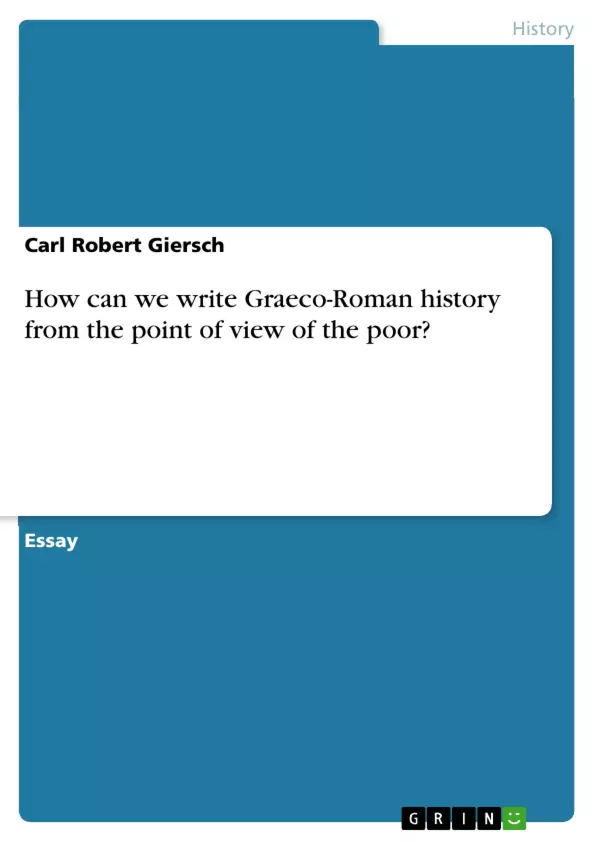This essay aims to prove that we can see Graeco-Roman History from the point of view of the poor only as the view of a whole class. Although it does not discuss the problem of slavery, only the issue of poor, unfree and otherwise fettered peoples.
Exploring primary and secondary accounts: two Greek authors, the theory of Marx and the arguments of de Ste. Croix will demonstrate that we are only able to see their point of view of the poor based on generalisation, always with another aim than writing the history from the point of view of the poor. We can only explain societal movements but cannot explore personal and individual motivations.
The history of Graeco-Roman societies is a history of division and class struggle. Every city, every country and every empire has always been divided between the plebeians and the patricians, between the aristocrats and the peasants: between the rich and the poor. However, if we speak about antiquity, we consider almost exclusively the upper-class perspective, the perspective of the wealthy and of the nobles – even though the majority of the world was poor or enslaved.
Inhaltsverzeichnis (Table of Contents)
- How can we write Graeco-Roman history from the point of view of the poor?
- Solon
- Aristophanes
- De Ste. Croix
Zielsetzung und Themenschwerpunkte (Objectives and Key Themes)
This essay aims to explore the possibility of writing Graeco-Roman history from the perspective of the poor, focusing on free, unfree, and enslaved individuals. It examines primary and secondary accounts, exploring the limitations and biases inherent in these sources.
- The challenges of understanding the experiences of the poor in antiquity.
- The role of class and social status in Graeco-Roman societies.
- The limitations of generalisations and the need for specific evidence.
- The influence of Marxist interpretations on historical analysis.
- The complexities of defining poverty and its impact on individual lives.
Zusammenfassung der Kapitel (Chapter Summaries)
- How can we write Graeco-Roman history from the point of view of the poor? This chapter introduces the central question of the essay and highlights the prevailing focus on upper-class perspectives in traditional historical narratives. It argues that writing from the perspective of the poor requires careful consideration of sources and their inherent biases.
- Solon This chapter examines the views of Solon, an Athenian statesman who addressed political matters in his poetry. Through his writings, Solon provides insights into the social hierarchy and the experiences of the poor in Athenian society. However, his perspective is considered limited due to his reliance on generalizations and his position as an outsider looking in.
- Aristophanes This chapter explores the work of Aristophanes, a playwright who used comedy to address social issues. Through the characters and situations he depicts, Aristophanes offers a glimpse into the daily life of the lower classes in Athens, highlighting their awareness of poverty and its impact on their lives.
- De Ste. Croix This chapter examines the work of G.E.M. de Ste. Croix, a historian who provided a Marxist interpretation of Greek history. De Ste. Croix emphasizes the role of class struggle in ancient society, focusing on the experiences of slaves. His work raises questions about the definition of poverty and the limitations of applying Marxist frameworks to ancient societies.
Schlüsselwörter (Keywords)
This essay explores the historical experiences of the poor in the Graeco-Roman world, focusing on themes of class struggle, social inequality, and the challenges of reconstructing individual perspectives from historical sources. It examines the works of Solon, Aristophanes, and de Ste. Croix, highlighting the limitations of generalisations and the importance of considering the specific context and biases of individual authors.
Frequently Asked Questions
Why is it difficult to write history from the perspective of the poor?
Most primary sources from antiquity were written by the wealthy upper class, leaving the experiences of the poor mostly documented through generalizations by outsiders.
What was Solon's view on the social hierarchy in Athens?
As a statesman and poet, Solon addressed the struggles of the poor, but his perspective remained limited by his own high social status and political aims.
How does Aristophanes depict the lower classes?
Aristophanes used comedy to highlight the daily lives and awareness of poverty among the lower classes, providing a rare (though satirical) glimpse into their motivations.
What is G.E.M. de Ste. Croix's contribution to this topic?
De Ste. Croix applied a Marxist framework to Greek history, emphasizing class struggle and the exploitation of the unfree as the core of ancient society.
Can we identify individual motivations of the poor in antiquity?
Generally no; historians can explain broad societal movements and class issues, but personal testimonies from the poor themselves are almost entirely absent.
- Quote paper
- Carl Robert Giersch (Author), 2018, How can we write Graeco-Roman history from the point of view of the poor?, Munich, GRIN Verlag, https://www.grin.com/document/418703



